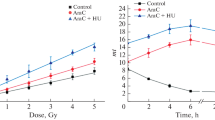Abstract
In vivo DNA damage and repair was induced by nicotinamide (NAM) in adenotype 12 virus-induced mouse sarcoma A12B3 and sarcoma F inoculated into CBA mice. DNA damage, NAM and NAD concentrations were measured after in vivo exposure to NAM, in tumours and spleens by alkaline elution and by HPLC analysis. Our results indicate that NAM between 100-1000 mg kg-1 causes a high level of in vivo DNA strand breaks in tumours and normal tissues in mice bearing the immunogenic sarcoma A12B3 but not in the non-immunogenic sarcoma F. The repair process was also delayed by the NAM treatment probably owing to inhibition of the DNA repair enzyme, poly(ADP-ribose)polymerase, as evidenced by accumulation of NAM and NAD. These data are consistent with NAM having a mechanism of action as a radiosensitiser at least in part by DNA repair inhibition. In addition, it should also be considered that high doses of NAM might cause considerable complications to normal tissue in tumour-bearing individuals.
Similar content being viewed by others
Author information
Authors and Affiliations
Rights and permissions
About this article
Cite this article
Olsson, A., Sheng, Y., Pero, R. et al. DNA damage and repair in tumour and non-tumour tissues of mice induced by nicotinamide. Br J Cancer 74, 368–373 (1996). https://doi.org/10.1038/bjc.1996.367
Issue Date:
DOI: https://doi.org/10.1038/bjc.1996.367
- Springer Nature Limited




